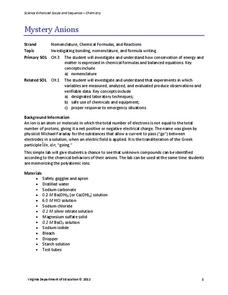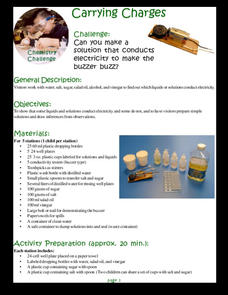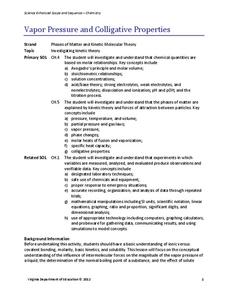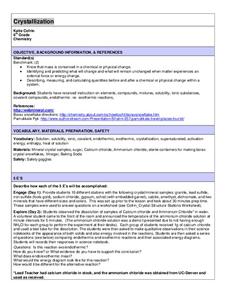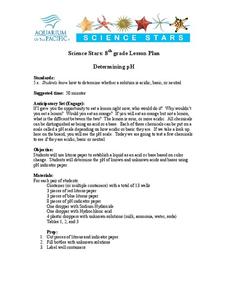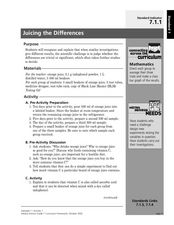Florida International University
Are You Concentrating?
Explore the importance of a concentration gradient in the rates of dissolution. Using the ocean ecosystem, learners study rates of dissolution around coral reefs. A hands-on experiment helps individuals discover the effects of changing a...
Virginia Department of Education
Mystery Anions
Lost an electron? You should keep an ion them. Young chemists learn qualitative analysis in the second activity of an 11-part chemistry series. After observing reactions of simple salts, the teacher provides pupils with unknown samples...
Sciencenter
Carrying Charges
What's all the buzz about electricity? Scholars take part in a scientific activity to test the conductivity of liquids and solutions. They first see if water, salad oil, alcohol, and vinegar cause a buzzer to buzz when electrodes are...
Virginia Department of Education
Vapor Pressure and Colligative Properties
Hate to vacuum, but enjoy using a vacuum pump? Explore a lesson plan that starts with a demonstration of boiling water at various temperatures by using a vacuum pump. Then scholars design their own experiments to measure vapor pressure...
Virginia Department of Education
States of Matter
Scientists have been studying exothermic reactions before they were cool. The lesson begins with a discussion and a demonstration of heat curves. Scholars then determine the heat of fusion of ice and the heat needed to boil water through...
Virginia Department of Education
Predicting Products and Writing Equations
A chemistry lesson plan presents 14 chemical reactions for scholars to observe, write the equation, and balance the equations. Additionally, it provides ways to extend the activity as it relates to catalysts.
Curated OER
The Magic School Bus Baked in a Cake
Students learn along with Ms. Frizzle's class. In this Magic School Bus lesson plan, students learn that baking is like a chemistry experiment as they make chemistry happen by following a recipe for pretzels.
Curated OER
Teaching about Data Interpretation
Students explore a variety of relevant lake water chemistry questions, compose responses, and present their results in a poster format. They, in pairs, answer questions about lake chemistry which are imbedded in this plan.
Curated OER
Take the Lead — Get the Lead Out
Students research about the physiological effects of prolonged lead exposure. In this chemistry lesson plan, students investigate the lead content of different paint, soil and water samples. They analyze data trends and share their...
Curated OER
Nonmetals
Learners research about the chemical processes involved in cave formation. In this chemistry lesson, students draw or find a cave picture with stalagmites and stalactites online. They write a brief caption and share them with the class.
Curated OER
Great Lakes Ecology
High schoolers are able to use a secchi disk to measure the turbidity of water by determining the depth at which the sechi disk is no longer visible and using the data in a formula to quantify the results. They are able to use Vernier...
Curated OER
A Plop and Fizz
Seventh graders perform an experiment to determine the effect of temperature on reaction rates. In this chemistry lesson, 7th graders take measurements and record data. They create a graph and analyze results.
Curated OER
Latent Heat of Fusion
Young scholars conduct a series of investigation on latent heat of fusion. In this chemistry lesson, students explain how thermal storage systems work. They draw and interpret graphs.
Curated OER
Creating a Pond Habitat
Students create a pond habitat inside and outside their classroom. In this pond lesson plan, students create a habitat with animals, water, and plants in order to create a proper pond habitat.
Curated OER
Halogens
Students identify the elements that belong to the halogen family on the periodic table. In this chemistry lesson, students describe the common characteristics of elements in this group. They research about hydrochloric acid's effect on...
Curated OER
Catalase and Catalysis
Learners explore enzyme catalysis through a series of experiments. In this chemistry lesson plan, students determine the factors affecting catalysis. They explain the different uses of this process.
Curated OER
How Strong is the Solution
Students investigate the strength of solutions. For this scientific inquiry lesson plan, students examine various solutions of food color and water as they discover the concentration of the solutions by adding bleach to clear the color.
Curated OER
Crystallization
Eighth graders analyze physical change in mass. In this chemistry lesson, 8th graders describe, measure and calculate the amount of physical change occurring in mass before and after the change. Students should be familiar with elements,...
Curated OER
Determining pH
Eighth graders explain the difference between acids, bases and neutral solutions. In this chemistry lesson, 8th graders describe the properties of each. They determine the pH of an unknown solution using the indicator paper and pH scale.
Curated OER
Juicing the Differences
Seventh graders investigate the vitamin C content of orange juice. In this chemistry lesson, 7th graders analyze the variables that cause result variation in their experiment. They design a new experiment to test variables in question.
Curated OER
The Discovery of OXygen
Students conduct experiments to identify the different properties of oxygen. For this chemistry lesson, students examine its importance to life on Earth. They explore the historic dispute about oxygen's discovery.
Curated OER
Properties of Salt
Students see how the properties of salt affect the color of flame, the flow of electricity, and the freezing temperature of water. They identify salt and sugar crystals under a microscope and discuss various practical uses of salt.
Curated OER
Chemistry E3 Lesson Plan
Ninth graders perform a series of experiment to investigate heat transfer and phase changes. In this physical science lesson, 9th graders identify and calculate the different subatomic particles. They explain the importance of scientific...
Curated OER
Chemistry And The Nitrogen Cycle
Students investigate the factors that compose the nitrogen cycle. The harmful effects of acid rain and ozone depletion are also discussed in the lesson. Students define the nutrient that is often limiting to plant growth through...
Other popular searches
- Water Chemistry
- Lake Water Chemistry
- Water Chemistry Ions
- Co2 Water Chemistry
- Water Chemistry Lesson Plans
- Ocean Water Chemistry
- Basic Water Chemistry
- Water Chemistry Properties
- Storm Water Chemistry
- Marine Water Chemistry
- Size vs. Water Chemistry
- Water Chemistry Nitrate



